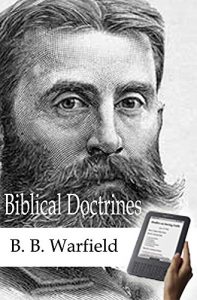In this work, published in 1897, Warfield combines two very different works he wrote into one volume in order to make them easier to obtain. The first is titled “Augustine and the Pelagian Controversy,” and the second, “The Development of the Doctrine of Infant Salvation.” He makes no attempt to connect these works in any way, but mentions in the scant preface that while the first article differs quite little from its original form, the second has been enlarged and, in some areas, re-written.
The article on Augustine and Pelagius served as an introduction to Philip Schaff's “Nicene and Post-Nicene Fathers,” and preceded translations of Augustine's Anti-Pelagian treatises. Warfield, ever the scholar, displays an intimate familiarity with Augustine's works, citing him numerous times from a number of different works. He sets the stage historically, letting the audience know not just what Augustine and Pelagius said, thought and did, but also those around them who were involved in the debate, such as Coelestius and Zosimus.
Warfield claims that the article on infant salvation “originally appeared in a monthly magazine,” (see Preface) but I have been unable to determine to what journal he is referring, the original title of the article, or the first date of publication. Beginning with the Patristics, Warfield investigates the doctrine of infant salvation from the dawn of Christianity through the ages. Not content to limit his study to the Reformed position, he also details the Roman Catholic, Anglican and Lutheran stances. He interacts with various theologians and official church documents from each of these groups, and attempts to make honest summaries and syntheses of their positions.
Infant salvation is not typically a hot topic today, but those interested in the issue will find Warfield's short article rich in references for further study and academically fair in its portrayal of opposing views. His stance on the issue is that the children of believers are saved, and those of pagans are not all lost, although how it is God has chosen to save them, He has not seen fit to share with us. Warfield claims that while this is not the universal Reformed position, it is the most widely held, and the one he considers most consistent with Scripture.
This book was created using OCR software, and was subsequently proof-read closely by a human. While we proof our texts carefully before selling them, occasionally errors do creep in. Please help us perfect our titles by submitting errors to corrections@pneuma-press.com.
Roman numerals for chapters and Bible quotations have been updated to modern numbers. Footnotes have been converted to end notes connected by hyperlinks.
The article on Augustine and Pelagius served as an introduction to Philip Schaff's “Nicene and Post-Nicene Fathers,” and preceded translations of Augustine's Anti-Pelagian treatises. Warfield, ever the scholar, displays an intimate familiarity with Augustine's works, citing him numerous times from a number of different works. He sets the stage historically, letting the audience know not just what Augustine and Pelagius said, thought and did, but also those around them who were involved in the debate, such as Coelestius and Zosimus.
Warfield claims that the article on infant salvation “originally appeared in a monthly magazine,” (see Preface) but I have been unable to determine to what journal he is referring, the original title of the article, or the first date of publication. Beginning with the Patristics, Warfield investigates the doctrine of infant salvation from the dawn of Christianity through the ages. Not content to limit his study to the Reformed position, he also details the Roman Catholic, Anglican and Lutheran stances. He interacts with various theologians and official church documents from each of these groups, and attempts to make honest summaries and syntheses of their positions.
Infant salvation is not typically a hot topic today, but those interested in the issue will find Warfield's short article rich in references for further study and academically fair in its portrayal of opposing views. His stance on the issue is that the children of believers are saved, and those of pagans are not all lost, although how it is God has chosen to save them, He has not seen fit to share with us. Warfield claims that while this is not the universal Reformed position, it is the most widely held, and the one he considers most consistent with Scripture.
This book was created using OCR software, and was subsequently proof-read closely by a human. While we proof our texts carefully before selling them, occasionally errors do creep in. Please help us perfect our titles by submitting errors to corrections@pneuma-press.com.
Roman numerals for chapters and Bible quotations have been updated to modern numbers. Footnotes have been converted to end notes connected by hyperlinks.









